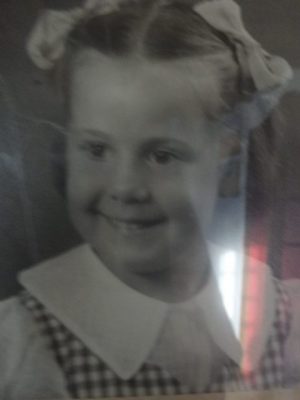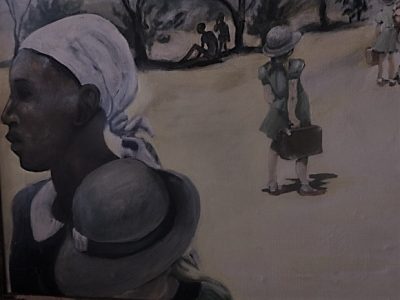For a child, facts are fantastical and fantasy, factual
 Somewhere in my infancy, there is a thick green privet hedge, clipped and trimmed to right-angled perfection. It encloses a perfectly square empty space brimful of desolation. It contains no house, no people live there and it is nameless. Its eternal position is located somewhere inside the fortnight when my mythical mother vanished forever, but returned immediately with the fact of my baby sister. I can only recall the hedge. Perhaps I did live inside it once long ago.
Somewhere in my infancy, there is a thick green privet hedge, clipped and trimmed to right-angled perfection. It encloses a perfectly square empty space brimful of desolation. It contains no house, no people live there and it is nameless. Its eternal position is located somewhere inside the fortnight when my mythical mother vanished forever, but returned immediately with the fact of my baby sister. I can only recall the hedge. Perhaps I did live inside it once long ago.
Childish ghosts
Years before my mother’s disappearance, two time-travelling ghost children began to haunt my parents and stayed with them until they died. As a result, my mother had to be on duty each day to keep my sister and me from being harmed by them. As we could not be trusted to a nanny, we were left alone when my mother and her friends played tennis at the club across the road. Then Clare and I hid from each, and hunted the other, under the scruffy eucalyptus trees around the stick and straw pavilion where tea was served.Tea was made by two black men or boys. All I knew was that they had grown up higher than me and that they crouched down very low around the wood fire where the water was boiled and where my sister tested the flames with her first finger. Her finger blistered so I was smacked. That was how I learnt about cause and effect.
Out-of-bounds
The two of us were kept separate from the black people our parents employed. We must only go where my mother went. In the out-of-bounds kitchen there was a man who stood up to prepare our food. Also out-of-bounds was the small cement house or kia where he lived. It smelt of smoke and the walls were stained with soot. There he sat on the ground to cook food for himself in a big black saucepan on a charcoal fire. Once he gave us mealie pap to taste. We pulled faces, and laughed and ran away just as we were supposed to do. Once there was a black woman in the kitchen and I came in to stare at her. She laughed, then showed me a trick. With her finger, she rolled her top eyelids over and up. They looked like raw pink wounds on her dark face. I screamed and once again ran away, my heart pounding.
“No, she didn’t hurt herself.” my mother answered.
Chiefs
 The servants addressed my father as Inkos, while Clare and I were called the Inkosikas. My mother was either Inkosi or Madam.
The servants addressed my father as Inkos, while Clare and I were called the Inkosikas. My mother was either Inkosi or Madam.
“What does Inkosika mean? “ I asked.
“It’s polite,” my father said somewhat shamefaced, “It means you are the children of the chief.”
“Oh,” I said. It sounded like one of our pretend games.
“Inkos means Chief.” my father added.
I didn’t believe my dad was really a chief because, at that time, he had a job in town.
Fixing Dad
Once my dad messed up something he was supposed to do and my mother was quite forgiving about it. She smiled at my sister and me.
“I’ll have to fix your dad won’t I?” she said.
I frowned. The only thing I had ever seen fixed was the punctured car tyre. For a while, I was very concerned for my father. Would he really have to curl up in a ball with bolts holding him together while he was rolled around in the car boot?
I knew he often got things wrong because he was deaf and a man. Sometimes he forgot about me and Clare altogether because our voices were too high-pitched for him to hear. He forgot to collect me from school one day so I started to walk home and that made him very cross.
6 Comments on “Mythological me – images from a memoir of childhood”
How fascinating Ruth. I have always seen angels, ghosts, aliens, people the ‘adults’ couldn’t. As a child I learnt to keep these experiences to myself as my parents were strictly ‘down to earth’, consequently I felt isolated and alone. So it was interesting to read that both your parents experienced the ‘time travel’ children. Now I am reading we see only energies, and that it is our programmed minds that tell us it is a table, a tree, our mother, or indeed an energy from another dimension that we are privileged to view here if we manage to escape our programmme. How lucky you were to be a child in the African environment where the indigenous peoples are much closer in their ancestry and genes to be able to see and experience beyond the veil that we call civilisation. My childhood was spent in the war and its aftermath where people were all too tied up in the fight to stay ‘alive ‘ as they saw it.
I haven’t seen time travelers myself but I have felt that people’s emotions and traumas, and passions do leave powerful and recognisable “stains” or traces or trails in our lives and I don’t think we fully understand the science of all this yet.
You’ve lived a very interesting life, Ruth. So much autobiographic material to write several books.
I have moved often and that is interesting I suppose in itself but you, June, have had an interesting life too and that’s reflected in your books and in your imagination.
Love the poetic nature of the writing. It chimes in with my current thoughts about being old and reflections or revisitings as I call them. It also chimes with local author’s book I am reading with input on psychology of remembering or forgetting – Alan Kennedy ‘Oscar and Lucy’ though his book has other personal chimings- academia, Germany after the second world war, Dartington school etc. I have written rather quickly my ‘Auto’as who knows how much time is left? But I want now to write slowly ….. All best Ellen
Thank you for reading and commenting on my post Ellen – I am happy that it connected with your own thoughts – yes – I, too, have written fast beccause time has felt so short and I long to write slowly and reflectively